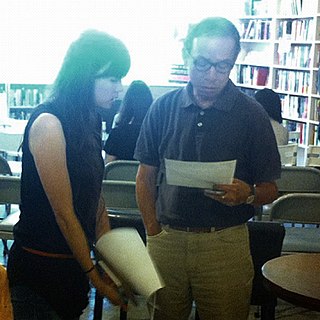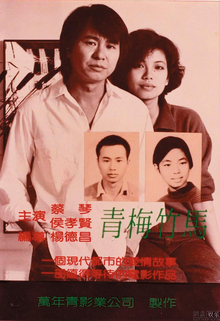
Hou Hsiao-hsien is a retired Mainland Chinese-born Taiwanese film director, screenwriter, producer and actor. He is a leading figure in world cinema and in Taiwan's New Wave cinema movement. He won the Golden Lion at the Venice Film Festival in 1989 for his film A City of Sadness (1989), and the Best Director award at the Cannes Film Festival in 2015 for The Assassin (2015). Other highly regarded works of his include The Puppetmaster (1993) and Flowers of Shanghai (1998).

Chu Tʻien-wen is a Taiwanese fiction writer. Chu is perhaps best known for writing the screenplays for most Hou Hsiao-hsien films. She is the recipient of the 2015 Newman Prize for Chinese Literature.

Flowers of Shanghai is a 1998 Taiwanese drama film directed by Hou Hsiao-hsien. It is based on the novel The Sing-song Girls of Shanghai (1892) by Han Bangqing, which was originally written in the Wu language (吳語) and translated into Mandarin Chinese by Eileen Chang. The film stars Tony Leung as a wealthy patron and Michiko Hada, Annie Shizuka Inoh, Shuan Fang, Jack Kao, Carina Lau, Rebecca Pan, Michelle Reis and Vicky Wei as "flower girls" in four high-end Shanghai brothels. It was voted the third best film of the 1990s in the Village Voice Film Poll conducted in 1999. The film was selected as the Taiwanese entry for the Best Foreign Language Film at the 71st Academy Awards.

A City of Sadness is a 1989 Taiwanese historical drama directed by Hou Hsiao-hsien. It tells the story of a family embroiled in the "White Terror" that was wrought on the Taiwanese people by the Kuomintang government (KMT) after their arrival from mainland China in the late 1940s, during which thousands of Taiwanese and recent emigres from the Mainland were rounded up, shot, and/or sent to prison. The film was the first to deal openly with the KMT's authoritarian misdeeds after its 1945 takeover of Taiwan, which had been relinquished following Japan's defeat in World War II, and the first to depict the February 28 Incident of 1947, in which thousands of people were massacred by the KMT.

Wu Nien-jen is a Taiwanese screenwriter, director, and writer. He is one of the most prolific and highly regarded scriptwriters in Taiwan and a leading member of the New Taiwanese Cinema, although he has also acted in a number of films. He starred in Edward Yang's 2000 film Yi Yi. Wu is a well-known supporter of the Democratic Progressive Party and has filmed commercials for the party.

Jiufen, also spelled Jioufen or Chiufen, is a seaside mountain area in Ruifang District, New Taipei City, Taiwan.

The Time to Live and the Time to Die, also known as A Time to Live, A Time to Die is a 1985 Taiwanese film directed by Hou Hsiao-hsien. This film is inspired by Hou's own experience of growing up in Fengshan, Kaohsiung city. It is the second part of Hou's coming-of-age trilogy, preceded by A Summer at Grandpa's (1984) and followed by Dust in the Wind (1986).
Growing Up is a 1983 film by Taiwanese filmmaker Chen Kunhou. The screenplay was the first collaboration between Hou Hsiao-hsien and Chu T’ien-wen. The film made the young star, Doze Niu, "a pop icon and tagged him with a rebellious image."
Chen Kun-hou (陳坤厚) is a veteran cinematographer, who started his career in the 1960s. He won his first best cinematography award at Golden Horse Awards in 1978 for He Never Gives Up (汪洋中的一條船), directed by Lee Hsing (李行). In the early 1980s he began to direct his own films in collaboration with Hou Hsiao-hsien (侯孝賢). After series of urban comedies, he made quite a few representative films of the Taiwan New Cinema, such as Growing Up, which won him the best director award at the Golden Horse Awards, His Matramony, which won him the second best cinematography award at Golden Horse Awards, and My Favorite Season, and Osmanthus Alley. He is awarded for his life achievement in Taiwan cinema at the 60th Golden Horse Awards in 2023.

Taipei Story is a 1985 Taiwanese film directed by Edward Yang — his second full-length feature film and third overall. The film stars Hou Hsiao-hsien and singer Tsai Chin to depict the grinding relationship of Ah-lung and Ah-chen, who have known each other since childhood in Taipei. It is doomed to fail because Ah-lung cannot forget about the past while Ah-chen is eager to embrace the future as Taipei undergoes modernization and globalization. Taipei Story is one of the representative films of the New Taiwanese Cinema. It won the FIPRESCI Prize at the 38th Locarno Film Festival in 1985.
Li Tien-lu was a Taiwanese puppeteer. He is best known to the international audience for playing principal characters in several Taiwanese films directed by Hou Hsiao-hsien.
Daughter of the Nile is a 1987 Taiwanese film directed by Hou Hsiao-hsien.
Jack Kao is a Taiwanese actor.
The Boys from Fengkuei, also known as All the Youthful Days, is a 1983 Taiwanese film directed by Hou Hsiao-hsien. The movie is about a group of impulsive teenagers with nothing to do and high energy. While waiting to be enlisted in the army, they cause trouble in their hometown, Fengkuei, and run away from Penghu to Kaohsiung. From a small town to a big city, through the depression and turmoil of youth they experience unforgettable life scenery and gradually recede from their original youthfulness. It was Hou Hsiao-hsien's first art film after he directed three light comedies in the early eighties and a representative work of the Taiwan New Cinema at its inception.

Dust of Angels is a 1992 Taiwanese crime film directed by Hsu Hsiao-ming, executive produced by Taiwanese filmmaker Hou Hsiao-hsien. It was entered into Directors' Fortnight at the 1992 Cannes Film Festival. "An lah" (安啦) is a Taiwanese Hokkien colloquialism; the title in full roughly translates to "take it easy, lad" or "cool it, kid."
Chiu Fu-sheng is a Taiwanese film producer and real estate developer.
Chen Ming-chang (陳明章) is a Taiwanese folk singer, guitarist, Taiwanese yueqin player, composer, and producer born in Beitou. He is known for writing scores for the Hou Hsiao-Hsien films Dust in the Wind (1985) and The Puppetmaster (1993), as well as for songs such as "She Is Our Darling" and "Wandering to Tamsui". He is stylistically known for singing primarily in Taiwanese Hokkien, incorporating traditional styles and instruments into his music, as well as songs that represent the Taiwanese underclass.

Hsieh Hsin-Ying, also known as Nikki Hsieh is a Taiwanese actress and model. Her works have expanded in different realms, including advertising, movies,and TV series. She appeared in the movies including Make Up, i WEiRDO, and The Assassin. As for the TV shows, she participated in Light the Night, Love @ Seventeen, and Meet Me @ 1006. In 2006, she participated in Reflections and won the 43rd Golden Horse Award for the Best Supporting Actress.
Lu Hsiao-Fen is a Taiwanese actress known for her roles in the woman's revenge subgenre within Taiwanese social-realist cinema. In the later years of her career, she was critically acclaimed as an actress in adaptations of Taiwan nativist novels, most prominently A Flower in the Raining Night.










